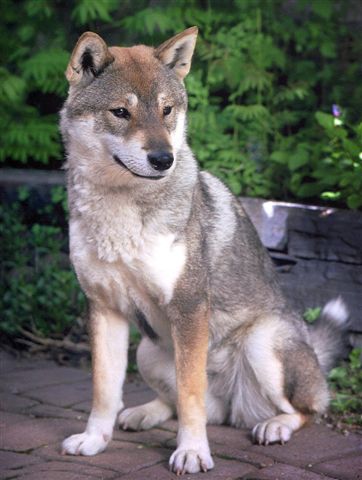Type the name of the breed you're looking for below
[wpdreams_ajaxsearchlite] Don't see the breed your're looking for? Click here and let us know!
Breed Characteristics
1 paw - breed exhibits the least amount of this characteristic
5 paws - breed exhibits most amount of this characteristic
Shikoku
| Other Names | Kochi-ken, Mikawa Inu, Japanese Wolfdog, Shikoku-Ken |
| Country of Origin | Japan |
| Weight | 35 - 50 lbs. (16 - 26 kg) |
| Height (at withers) | 7 - 21 in. (46 - 52 cm) |
| Coat | The Shikoku tends to shed its coat at least one to two times a year. The dog has a fairly thick coat with pointed ears and a curved tail. The body conformation is typically of the spitz-type: the square body, the wedge-shaped head, the prick triangular ears, and feathered curled tail. |
| Colour | The Shikoku comes in sesame (red, black), black and tan (nonstandard colour), or cream (nonstandard colour). These colours consist usually of a light brown, a light red-brown, or a light black-brown. In addition, there is a cream coloured coat that tends to be very rare. In all of these colours there is usually a mixture of white found around the underside of the body, near the eyes, snout, and legs. |
| Litter Size | 1 - 6 puppies, average 4 - 5 |
| Life Span | 10 - 12 years |
| Origin & History | The Shikoku is also known as the Kochi-ken "ken" or "inu," which means dog in Japanese. Kin to the smaller Shiba and larger Akita Inu, the Shikoku-Ken is a rare breed of dog, even in its native Japan. In 1937, the Shikoku was established as one of Japan’s national treasures. The Japanese bred the Shikoku to hunt deer and wild boar in the mountainous and fairly isolated Kochi prefecture located on the island of Shikoku. Shikokus are some of the purest dog breeds due to the remote nature of the region, which greatly restricted crossbreeding. |
| Personality | The Shikoku is somewhat strongly tied to nature. It is cautious and brave; a temperate dog with good judgment. The Shikoku is also very loyal and submissive to its owner; it loves to be touched and often likes to give kisses. Although, it may be slightly aloof with strangers. This breed needs socialization early to avoid becoming aggressive toward other dogs. Dogs that do become dog aggressive need a competent owner/trainer who knows how to communicate to the dog that this is unacceptable behavior. Shikokus can get along with children if they are raised properly and vice-versa. They have a high prey drive and therefore may not be for everyone; should not be trusted with non-canine pets such as guinea pigs and hamsters. Since they are natural hunters, small animals in their yard may not exactly be safe. Shikokus are very intelligent and are fast learners. They need firm, confident and consistent leadership from the humans around them or they will become somewhat stubborn and quite relentless in attitude and play. Although, they are said to be an easier dog to handle than their smaller Shiba and larger Akita cousins. Quick to learn, one owner reports, "They actually like to learn! My puppy knew to sit perfectly square at 9 weeks. He'll actually get excited when he sees me bring out the clicker." They are quick and agile and may do well in agility or obedience. The alertness of a Shikoku may make it a good family watchdog. Shikoku pups can be quite vocal at times. They have a great sense of smell, which serves them well in tracking their quarry. Quiet indoors, the Shikoku loves exercise outdoors and is very energetic. Socialize well when young; obedience training is recommended. |
Care Requirements
| Health | There are no known breed-specific health concerns. |
| Grooming | They blow coat once or twice a year. A good undercoat rake makes grooming easy. Over-bathing may dry out their skin and therefore a bath every few months is usually sufficient. They do not have a strong doggy smell. |
| Exercise | Shikokus do best with a good amount of exercise; they need to be taken on a daily walk or jog. Do not let this dog roam free in an unsafe area. They have a high prey drive and may get themselves into trouble, i.e. hit by a car while chasing an animal. They are resilient and athletic dogs and show skills that may make them talented in agility or possibly obedience utility. |
| Other Considerations | They are quiet indoors, but love outdoor activities. They will not be happy away from their owners. Shikokus should have a fenced yard, as they are hunting dogs with by nature with a very keen sense of smell and may take to roaming. In popular culture; The anime-only characters of the series Ginga Legend Weed Ryo, Ryu, Heita, and Hanji (four dogs shown aiding Jerome) may be Shikoku. The series is by Yoshihiro Takahashi. |



